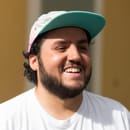With the internet being so easy to access, it has become easier for independent artists to find an audience and let their work be known. As a result, a variety of movements, collectives, and scenes have found a way to pave their path. The independent art scene in Puerto Rico is no different. Recently, many artists from a variety of disciplines have found platforms that have made it easier for them to share their work. In addition, small businesses such as Electroshock in Santurce and Rio Piedras, bars like Off The Wall in Mayaguez, book stores like La Casita Books and Gifts in Aguadilla, Libros AC in Santurce and Libros 787 online, and independent festivals like Feria de Libros Independientes y Alternativos and Tintero: Festival de Cómics y Arte Independiente de Puerto Rico have provided up-and-coming artists a space to display their talents. “Puerto Rican Women Killing It in the Independent Art Scene” is a series of interviews that provides a glimpse at some of the women who have recently gained recognition in the art scene. Though the artists are asked similar questions, some are asked queries surrounding their work, specifically.
Rosaura Rodríguez Muñoz is an illustrator and comic book artist who also provides art workshops.
(picture of the artist by Elena Vanasse Torres)
What got you into the visual arts?
I’ve been drawing cats and dogs (don’t we all?) and still life fruits since I was a kid. I left the Central School for Visual Arts in 9th grade because I got saturated; too much art, too structured, and at that moment I thought “I wasn’t going to do anything related to arts.” Those years there helped me a lot and gave me an awesome foundation. Eventually, I snuck into art courses in the university even if it wasn’t my major.
Why comics as a medium of expression?
They’re a way of telling stories, moments. They take too much time and work to make, but they achieve something particular and magical. I love reading and making comics. They’re as much literature as novels, poems on receipts and notes written on walls.
How was Días formed? How has it evolved?
Días started as a mutual proposal because we were interested in each other’s art and we wanted to collaborate. Originally we thought of making an illustrated alphabet but suddenly [Omar] Banuchi made a comic and I answered with one. We decided to make autobiographical stories and we self-published them once a month (or so) for a year. It was a great exercise for writing and drawing stories daily. We’ve been drawing and collaborating as Días for about 8 years.
How did you develop your style?
I’m still not sure what my style is. I feel it depends a lot on the medium I’m using (ink, pencil, watercolor). Sometimes I wanna make very concrete and figurative stories, other times super abstract minimal images, and also useful practical objects.
How has it evolved through the years?
I guess my style is somewhat childish. Simple and playful? I think it’s always had these characteristics but has refined or made clearer with time and practice. I’m still trying out new things and figuring out what I’m doing.
What are some of your influences and inspirations?
People, plants, landscapes. Crafts and the art of useful things. I read comics, children books, picture books. I love meeting and following artists, crafters, makers on Instagram (and real life), real humans who share their ideas, findings and processes for things they make. I love seeing art created by kids and folk who take my art workshops; they come up with honest and genuine lines and ideas, even while using the same medium as everyone else.
Is there any other form of art you wish to pursue? If so, what field and why?
I wish I had time to practice all the random and obscure crafts in the world. YOLO.
What do you think about the current state of the arts in Puerto Rico?
Puerto Rico is full of incredible and talented artists and creators. It’s absurd. Some are recognized internationally, some are struggling and some don’t even know they are artists. It’s definitely hard to live off “making art” but people find creative ways to keep doing, working, creating, in spite of the colonial and corruption disaster we live in. The government is focused on petty fundamentalist values and the arts (and education, and health, and other fields) are far from being a priority.
What do you think about the current state of the independent scene in Puerto Rico?
It’s not easy but like I said before, people keep doing their thing, either from here or elsewhere.
If a young girl came up to you and said she wanted to be an artist, what would be your advice for her?
Yeah! Go for it. Create. Practice. Don’t try to imitate what you think is good art. Stop and observe. Really observe. Do whatever you want and and however you want it.
What is your biggest goal right now?
Finding balance between work that takes place indoors vs. outdoors. No big goal, just to be able to keep working and living through art and education.
What do you seek to achieve with work?
To keep contributing to the visual archive of stories around us in this context. To learn more and share about how to art within nature.
(picture of the artist by Elena Vanasse Torres)
Anything else you would like to add?
The Rosaura Rodríguez exhibit “Trabajo de Campo” at the Museum of Contemporary Art of Puerto Rico will be open until June 1st.
Find Rosaura Rodríguez Muñoz’s work on: her website and Instagram
All of the pictures in this article were provided by Rosaura Rodríguez Muñoz


